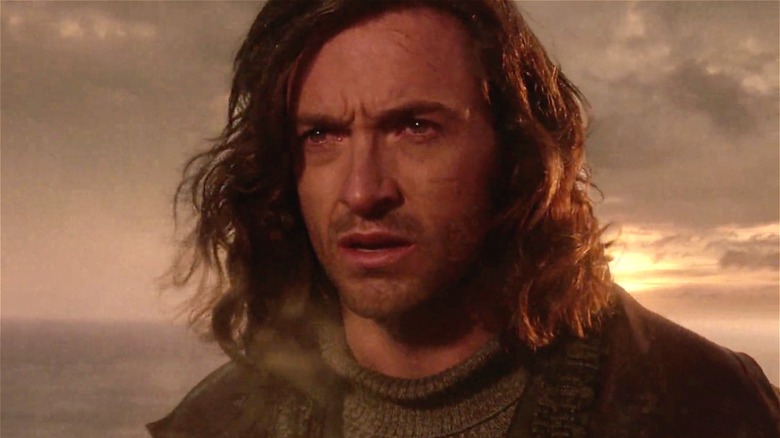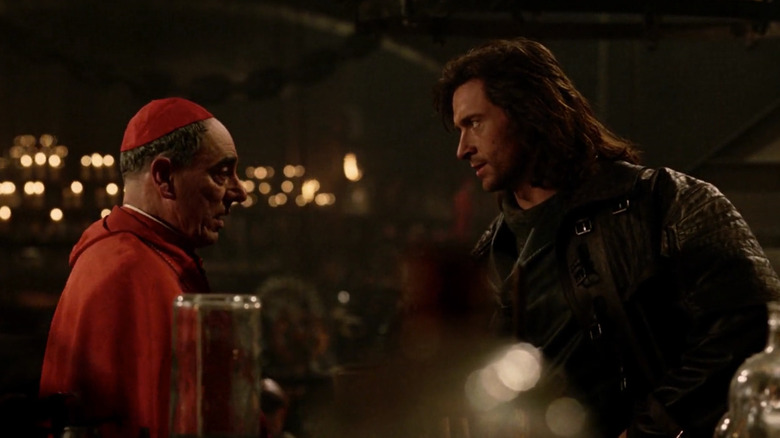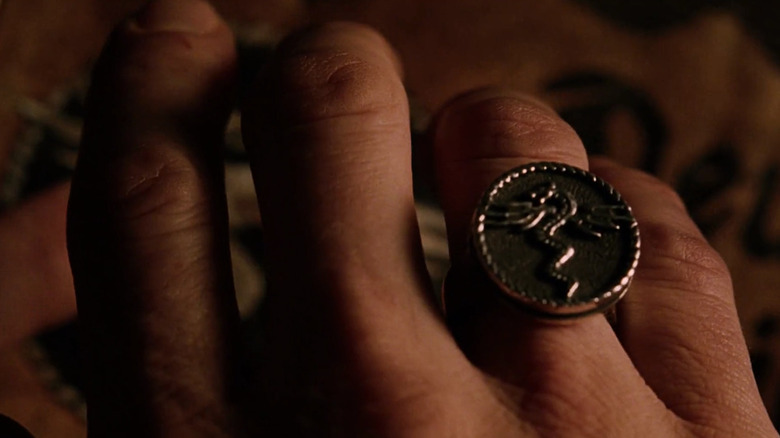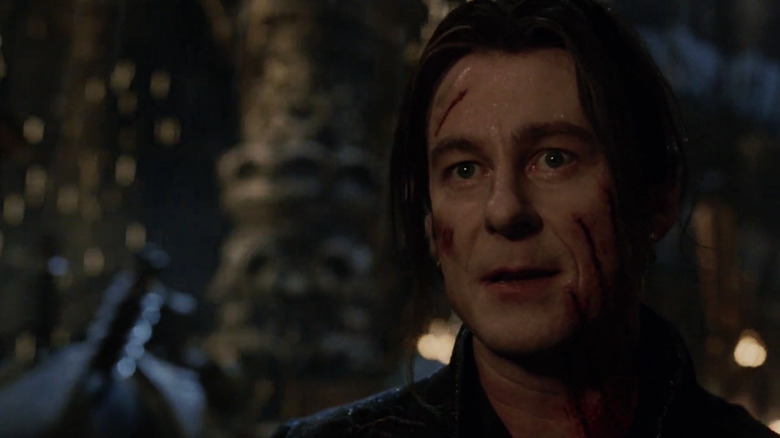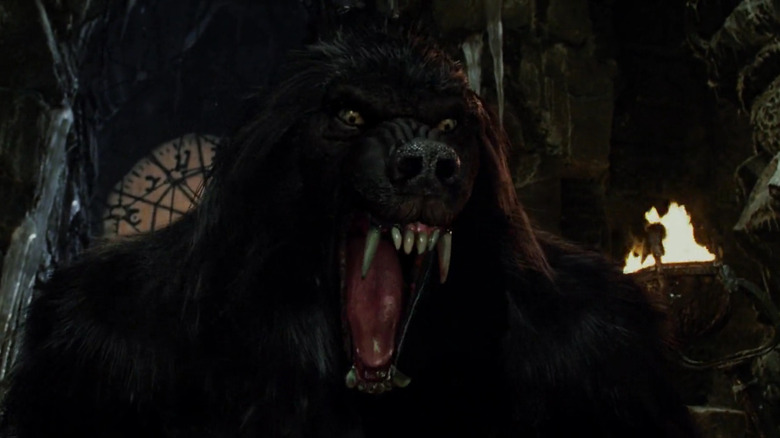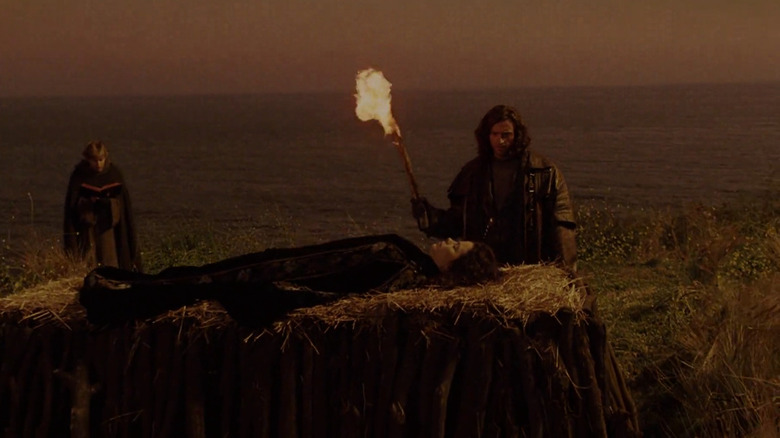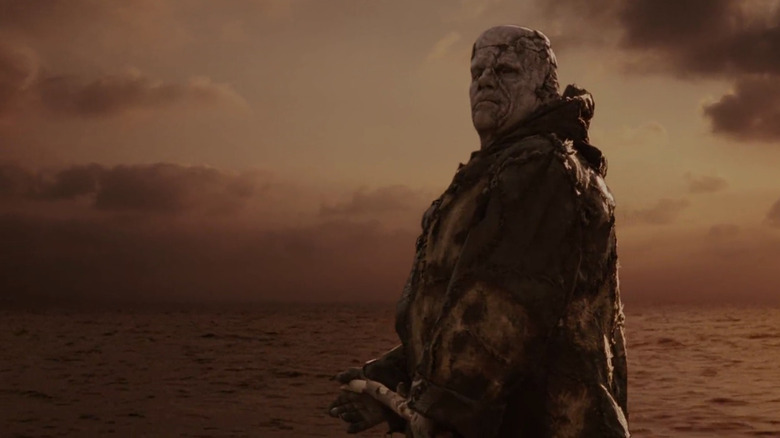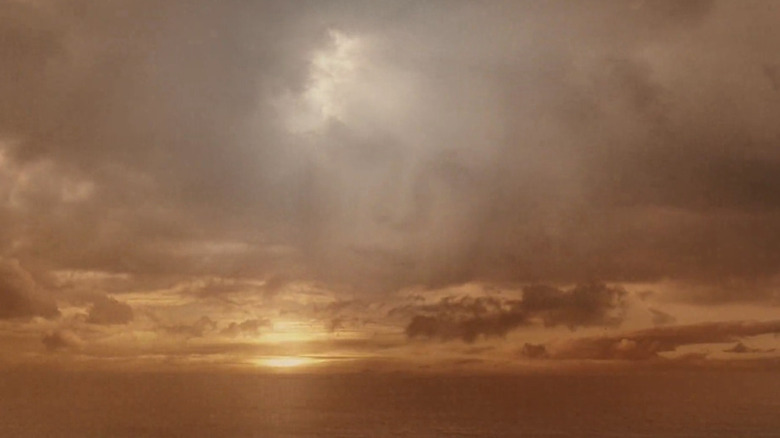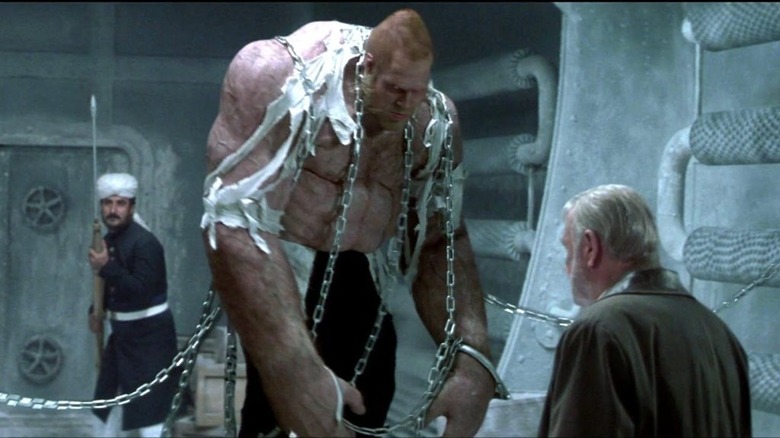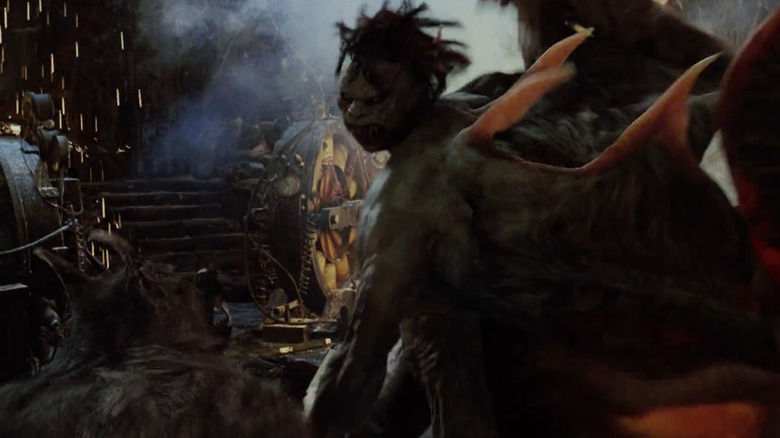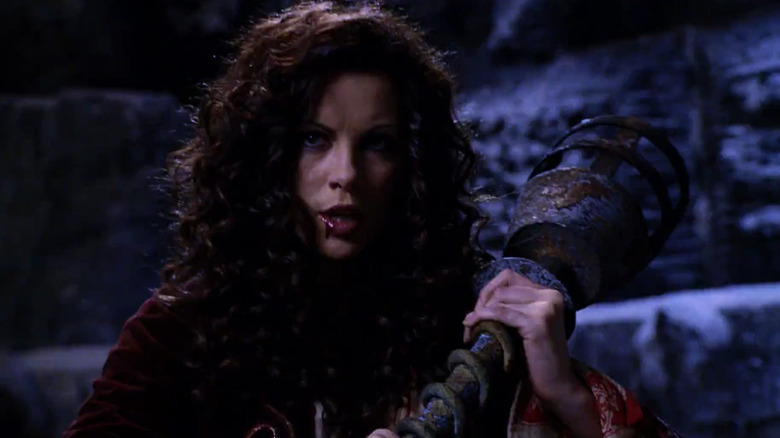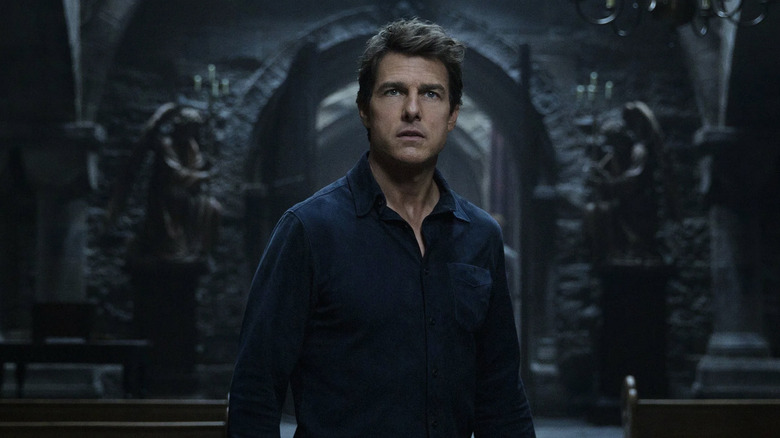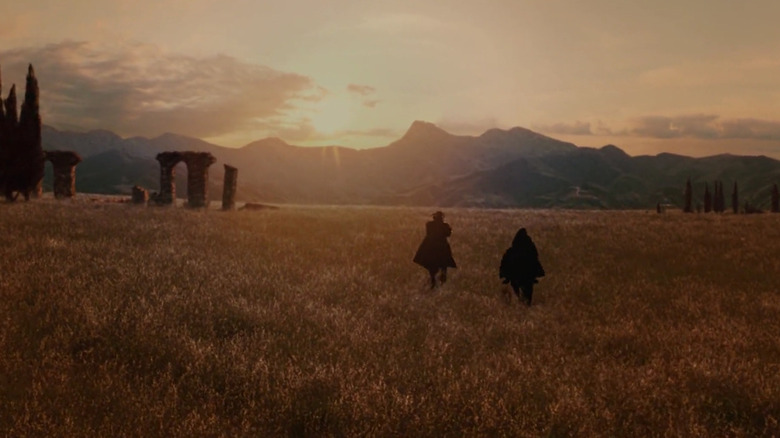The Ending Of Van Helsing Explained
While "Dracula" author Bram Stoker would have you believe that Van Helsing is a quirky Dutch polymath with a gentlemanly academic interest in monster hunting, director Stephen Sommers had something else in mind. Namely, "What if Van Helsing was hot?"
Released in 2004, "Van Helsing" offered a bold, swarthy reimagining of Stoker's character — who, to be fair, had taken on a life of his own throughout the 20th Century thanks to a storied career in Universal Monster movies. Just as he'd done with "The Mummy," Sommers imbued the horror staple with kinetic action, adventure, romance, and more camp than a U.S. National Park. Following its titular monster hunter (Hugh Jackman, hot off 2003's "X2: X-Men United"), Van Helsing goes on a quest for a secret society called the Holy Order to find and kill Dracula (Richard Roxburgh). Along for the ride are Carl (David Wenham), an ingenious friar-weapons expert and Anna (Kate Beckinsale), a Romani princess dead set on taking down Dracula so that her family's souls can enter heaven.
In the end, our heroes succeed when Van Helsing becomes the one thing that can kill Dracula: a werewolf. Unfortunately, while administering the antidote, Anna perishes. All told, a lot happens in the film's final moments. So set down your crossbows and let's have a look at what's going on with the ending of "Van Helsing."
1. Dracula is correct
In the film's climactic battle, Dracula and Van Helsing exchange blows and harsh words. Dracula's initial teasing takes on a desperate edge once he realizes he might not survive the encounter. As he pleads for Van Helsing to team up with him, Dracula makes a compelling observation: there's something rotten about how the Vatican treats Van Helsing. "You are being used, Gabriel!" Dracula infers that the Holy Order, the secret society that hired Van Helsing, has ulterior motives. Dracula then makes a comment about how "he escaped," which is most likely in reference to his death-defying deal with Satan. But before he can elaborate, Van Helsing (who, lest we forget, is a werewolf now) pile-drives him into some stray machinery.
Truthfully, Dracula is echoing what Van Helsing already suspects. While he is a man of faith, his feelings towards the church and the Holy Order are less than favorable. Earlier in the film, when Van Helsing reported back to home base after killing Dr. Jekyll/Mr. Hyde (Robbie Coltrane), our hero made it clear to Cardinal Jinette (Alun Armstrong) that he felt like he was nothing but a weapon — a fact that gets compounded later when Rome orders our hero to destroy Frankenstein's monster, which Van Helsing knows is not evil. The church seems patently uninterested in assuaging Van Helsing's guilt about all the creatures he has killed: to them, he's just a tool to be pointed in the right direction.
2. Van Helsing killed Dracula in the 15th Century
Cardinal Jinette was right: Transylvania did hold the answers to Van Helsing's past. A good deal of tidbits bubble to the surface during Dracula and Van Helsing's brawl. While the pair take a breather between beating the holy ghost out of each other, Dracula finally tells our hero (and us) how the pair know each other. In 1462, when Dracula was mortal, Van Helsing killed him.
Our first hint that Van Helsing knows Dracula from his amnesiac past takes place during his debrief at the Vatican when a look of recognition flashes across his face at the sight of Dracula's portrait. Dracula immediately confirms our suspicion that the pair have already crossed paths when the two first meet (retroactively making Jinette's remark that Van Helsing has "never faced one like this before" ironic). But it's not until the final dual that we learn more details.
We know Van Helsing killed Dracula (the first time), but it's not clear why. Given Dracula's immediate move post-mortem was to bargain with the Devil, it's likely he was up to no good. It's totally within the realm of possibility that he was already meddling with dark magic when Van Helsing knew him. For those wondering, this is the case in the officially licensed video game, which reveals that Dracula was up to occult shenanigans that provoked Van Helsing to take his life. He attempted to resurrect his lover, who the Holy Order previously killed.
3. There's a reason that Dracula keeps emphasizing he was murdered
Every time Dracula refers to his original death, he describes it as murder. This is, technically speaking, correct: Van Helsing murdered Dracula in 1462 when he was mortal. But the repeated insistence on the criminal aspect of Dracula's original death raises a few questions. While we don't get any explicit answers in the film, there is a lurking insinuation that the sin of murder might have been the traumatic event that led to Van Helsing's memory loss. Dracula seems keen to remind Van Helsing that they were once friends and he betrayed him by taking his life. That definitely sounds like the kind of thing that would cause a super-religious individual to bury their guilt and shame in the dustier parts of their memory.
The more palpable reason Dracula hammers on and on about being murdered is more thematic in nature. Before his Transylvanian escapade, Van Helsing felt like his job of "destroying monsters" was a lot like "murdering people." While Dracula probably doesn't have insight into Van Helsing's psyche, every time he reminds Van Helsing he's a murderer, it's a twist of the knife. Does this stop Van Helsing from killing Dracula again? Nope! As he rides off into the promise of a new dawn, it's left to us to decide if Van Helsing will change his monster-slaying ways or double down on them. Here's hoping his brief stint as a werewolf gave him some much-needed perspective.
4. Van Helsing isn't human
After Van Helsing is bitten by the lycanthropic Velkan (Will Kemp), our hero experiences some fun non-human superpowers. But before Van Helsing becomes "that which he has hunted so passionately," as Frankenstein's monster puts it, there's a strong suggestion that he's not entirely human.
Despite his thick fog of amnesia, Van Helsing has vivid nightmares of ancient battles he couldn't possibly have fought. When Carl asks Van Helsing if he remembers anything about his life before he showed up on the Holy Order's doorstep, Van Helsing replies that he remembers "fighting the Romans at Masada." If he's referring to the Siege of Masada, which Carl astutely notes was in A.D. 73 (over 1800 years before "Van Helsing" takes place), that would make Van Helsing super old. Dracula's accusation that Van Helsing murdered him raises similar chronological questions: How did Van Helsing kill Dracula 400 years ago?
Dracula addresses Van Helsing as "Gabriel," and "The Left Hand of God." While it's never clearly stated that Van Helsing is literally the Biblical Gabriel, his being an amnesiac archangel would explain how he's lived so long. It would also explain why he can "sense evil" and why he was fighting against the Romans at Masada, on the side of the Jewish Sicarii. It could also be the case that Van Helsing is just an earthly incarnation of the Biblical Gabriel, and the angel's memories are etched on him like a thumbprint. Either way, Van Helsing is not your run-of-the-mill human.
5. Why they cremated Anna...
In "Van Helsing," Anna mentions she has never seen the sea before. Naturally, when it's time to lay her remains to rest, Van Helsing and Carl perform the ritual on a seaside cliff, where Anna's body is laid atop a pyre and set ablaze. Now, if you aren't familiar with Catholic law, you'd be forgiven for accepting Anna's cremation as a creative decision to make her funeral feel more cinematic. Her ashes rising to the sky also allows the filmmakers to draw a visual connection to her (and her family's) ascendence into heaven. But, if you are familiar with Catholic law, you may be wondering why Carl isn't sweating profusely and begging Van Helsing to go get a shovel so that they don't get fired (or worse) when they get back to Rome.
Indeed, until 1963, the Roman Catholic Church expressly forbid cremation because anything else would stand in the way of resurrection. However, this might be exactly why Van Helsing and Carl cremated Anna. In a world where vampires and corpse-stealing mad scientists exist, burning a body isn't such a bad idea. There are far too many freaks out there. Hey, maybe the Holy Order and the Catholic Church have different rules about cremation? Who knows!
6. Frankenstein is off to see the world!
While Anna's funeral pyre blazes in the background, Frankenstein's monster starts his own journey. As the creature explained to Anna, his only desire is "to exist." Whether or not Frankenstein is going to "exist" for much longer given that his boat is less of a boat and more of a glorified heap of logs is left to our imagination. We can't imagine that his poor excuse for a vessel will fare well at the mere suggestion of a storm. What happens if it gets too hot and his rotting flesh attracts seagulls? Maybe we're overthinking this. Then again, someone has to, he clearly didn't.
Regardless, the image we're presented with — Frankenstein's monster setting out to sea — is an optimistic one. Given that the only coast within a reasonable distance from Transylvania is the Black Sea, we'd like to think he's on his way to a bustling port city like Istanbul. It would be convenient, too, if he were to travel to a country where face coverings and large robes were a social norm. All told, if he somehow doesn't wind up at the bottom of the Black Sea, Frankenstein's monster is well on his way to "existing" on his own terms in the big, wide, world. Good for him!
7. Anna's soul reunites with her family in heaven
"Van Helsing" is a lot of things but subtle ain't one of them. This is a film where Frankenstein's monster, holding the limp body of his creator like a sack of potatoes, looks out over the torch-bearing mob and bellows "why?" like he's auditioning for the Metropolitan Opera. There's an automatic crossbow Gatling gun. If you're coming to "Van Helsing" looking for restraint, you're barking up the wrong movie.
Case in point: the resolution of Anna's storyline. With Dracula slain, the Valerious clan's souls can now enter the pearly gates. How does the film go about representing this? By having Anna's face showing up in the sky — Mufasa style, obviously. After giving Van Helsing a beaming smile to let him know that she's cool with the whole "accidentally killing her while he was a werewolf" thing, we see Anna reunite with the spectral shapes of her deceased family members, including her dear brother, Velkan. Van Helsing finishes the film with a clear conscience: Anna is having a grand old time being dead. Her smoke-trailing soul even gives him a little caress as it ascends from the funeral pyre toward Heaven. He has nothing to lose sleep over.
8. A number of films were still fresh in everyone's minds
"Van Helsing" debuted during a strange time in the history of big-budget Hollywood fantasy-action movies. On the one hand, the early 2000s produced a handful of flicks that were, in many ways, the building blocks for what would become the modern "superhero" craze. By the time "Van Helsing" hit the big screen, one "Spider-Man" film, two "Blade" films, and two "X-Men" films had already been released. While "Van Helsing" definitely embodies some of that early noughties superhero movie energy (aided and abetted by the presence of Wolverine actor Hugh Jackman), it was also in conversation with a slew of dark, big-budget horror-tinged action films. Many of which were critically regarded as being "not very good."
The first "Underworld" film was a common point of comparison, both for its monster mash action and for starring Kate Beckinsale (an upsetting number of "Van Helsing" reviews have a wolf-like focus on her physical appearance in both films). Another movie likely lurking in the back of people's minds was 2003's "The League of Extraordinary Gentlemen," a big-budget, Richard Roxburgh-starring maximalist ensemble piece that famously did a critical prat fall upon its release. All to say: the cohort surrounding "Van Helsing" didn't exactly set it up for success.
9. The film is a throwback to Universal's monster mash horror films from the 1940s
One gripe about "Van Helsing" you're liable to hear again and again is that it is too "loud" — not literally but in the sum of its various moving parts. Frankenstein's monster, Dracula, and the wolf man? Igor and Dr. Jekyll/Mr. Hyde? In this economy? In all seriousness, even if you are a fan of the film, you can't deny that this film does have a lot going on — whether you embrace or cringe at this maximalism is a matter of taste.
While your enjoyment of the crowded monster roster will vary, Sommer's work was a callback to the Universal Monster crossover films of the 1940s. Move over, "The Avengers," "Frankenstein Meets the Wolf Man," "House of Frankenstein," and "Abbott and Costello Meet Frankenstein" were the original "extended universe" event films. With Universal's Dark Universe dead in the water (rumblings of its resurrection do exist, but should be taken with a salt mine's worth of salt). "Van Helsing" is currently the last word on a Universal monster mash film...for now.
10. Most critics hated it, but it turned a profit at the box office
To say that critics weren't buying what "Van Helsing" was selling is a bit of an understatement. The film currently enjoys an abysmal 24% on Rotten Tomatoes. The film's Metacritic rating is negligibly more favorable, ranking at 35. Writing for the New Yorker, film critic Anthony Lane claimed that the film was so bad that it was liable to make you "fear for the well-being of the [horror] genre" writ large. Meanwhile, Rex Reed of the Observer called the film "a noisy, nasty, and repulsive video game-slash-theme-park haunted house ride" — as if that doesn't sound super cool. Stephen Hunter of the Washington Post hits the nail on the head for fans and haters alike, remarking that "there's never a dull moment, but there's also never a moment."
For those wondering, one of the rare film critics who did appreciate the spectacle-heavy silliness of "Van Helsing" was none other than Roger Ebert, who hilariously began his three-star review by quoting Bobby "Boris" Pickett's one-hit-wonder "Monster Mash." Despite its critical pummelling, "Van Helsing," did, in fact, break even at the box office. The film sat in the number one spot on its opening weekend and ultimately made $300,157,638 worldwide on its budget of $160,000,000.
11. A reboot starring Tom Cruise got canned
If the idea of Tom Cruise being in a horror film feels "wrong" to you, keep in mind that, before "The Mummy," his horror movie role of Lestat in "Interview with the Vampire" is one of his best performances. The man can make the genre work for him. Given his mastery of action films, it makes sense that he would want to revisit the horror genre while being able to climb, jump, kick, and brawl to his heart's content.
Per a 2011 press release re-printed by Deadline, "Star Trek" producers Alex Kurtzman and Roberto Orci planned to oversee a modern reimagining of Universal's classic monsters. Cruise signed on to star and produce a reboot of "Van Helsing." If you're mentally picturing 5′ 7″ Cruise swimming in 6'3" Hugh Jackman's massive leather coat, it sounds like the powers that be weren't looking to pick up directly where Stephen Sommer's 2004 film left off. It would have been interesting to see if Cruise and company stuck to Sommer's action-adventure take on the character or if they would have flipped back to the traditional figuring of the character as more of a quirky hero-doctor — though the former seems the most likely, based on Cruise's casting.
We obviously didn't get a Cruise-helmed "Van Helsing" reboot (our loss, frankly). In the end, Cruise's energy for the "Dark Universe" project ultimately transferred to 2017's "The Mummy," which was also our loss.
12. A reboot is still on the table
If you're a "Van Helsing" appreciator, there's definitely something bittersweet about seeing our heroes gallop off into the sunrise. While there are orbiting stories in the "Van Helsing" universe overseen by Stephen Sommers — a comic book and an animated prequel — we never got a feature-length follow-up. But this might change!
According to this exclusive report from Deadline in 2020, a reboot is in the works with Julius Avery in the director's chair and "The Conjuring" and "Aquaman" director James Wan in a producer role. Eric Pearson, who co-wrote "Thor: Ragnarok," penned the original screenplay. Given Avery's previous work on the likes of the World War II zombie flick "Overlord," he's a perfect candidate to do the action-horror genre justice. The door is open to the film being rated R, which is great news because, as "Overlord" proved, Avery knows how to deliver a bone-crunching good time. There's no word yet on where the reboot stands, but we've got our fingers crossed that another feature-length Van Helsing story will someday grace the big screen soon.
